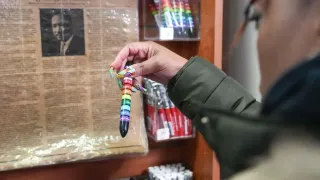Mar 12
Benson Boone Opens Up: 'I Can't Be the Icon of the Century'
Kilian Melloy READ TIME: 3 MIN.
Now that he's established himself as a top songwriter and a bona fide heartthrob, Benson Boone's having a hard time with the whole sex symbol thing.
"I definitely remember there was a time where I would take my shirt off because I didn't know what else to do," the 22-year-old Grammy nominee told Rolling Stone in a recent interview.
That initial uncertainly didn't last; now he's an expert at getting audiences going, whether that's through doing a flip or showing a little skin.
"After doing a lot of shows, you start to pick up on what people like and don't like, what girls like and don't like. There is an art to making anybody go crazy," the "Beautiful Things" singer explained.
However, he went on to add, "I also don't want people to come to a show expecting me to just take my shirt off and it to be like a gun show. One, I don't have the guns for that. Two, that's just not what I'm about."
Audiences might not have intuited that – not after moments like when he gave his tight-fitting outfit a hard tug at the crotch during an athletic performance at the Grammys, or the time last fall when he stunned onlookers and made headlines for departing a concert venue clad in little more than a Speedo.
And that's not the least of it: There's also the matter of the ripped singer's habit of posting thirst-inspiring gym selfies.
Still, "I don't want to rely on my physical form to be the primary driver of my shows," Boone, who has nearly completed his new album, "American Heart," told Rolling Stone.
The recording star delved deep into his personal history with music in his conversation with the music mag, admitting – almost sheepishly – that as a teenager (and even before the surprise discovery that he's a talented singer), he was a devoted fan of acts like Justin Bieber and One Direction... obsessions he indulged with his best friend Erik but hid from family members, including his sisters. "Honestly," Boone told Rolling Stone, "I was probably a bigger fan of them than any of my sisters."
Now he's inspiring fans in his own right. The magazine noted that his signature tune, "Beautiful Things," was "the most-streamed track in the world last year," and as if that weren't enough of a signal that he'd arrived, he was invited to open for none other than Taylor Swift last summer, during her Eras Tour.
And, for better or worse, it's not just the strength of his songwriting that makes some of his fans so ardent. Boone's physique is sculpted and lean, and it arguably draws at least as much devotion as his powerful voice. But maintaining that look, and making it such a part of his brand, isn't easy.
"It sucks to just focus on that all the time," Boone told Rolling Stone, adding that "when I start to think about my appearance too much, it just kills me because there's always something more I could do.... my arms could be bigger. My shoulders could be bigger. It's never-ending."
"I can't afford to think that way because I will never be happy if I do think that way."
His fans, of course, would be perfectly happy for Boone to lean into the Adonis thing. But there's more to the young singer-songwriter than his arms and abs.
"Obviously, like, I enjoy working out and I want to keep my physical shape because I need to," Boone said. "But I can't be the sex icon of the century, just because that's not who I am."
Or is it? If so, it's not intentional... but neither is it something that can be overlooked. Friend and collaborator Jack LaFrantz let Rolling Stone in on a little secret: Boone has a tendency to rip off his shirt even when laying down tracks in the studio setting.
"Nothing, even clothing, messing up the vocals," LaFrantz said, before teasing: "I will not confirm or deny whether pants are also on or not."






